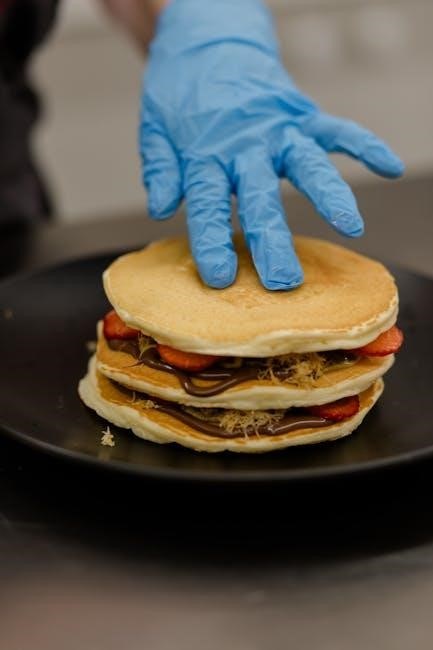A peptic ulcer diet focuses on managing symptoms and preventing recurrence by promoting healing. It includes bland, easily digestible foods to avoid stomach irritation and tailored eating plans.
1.1 What is a Peptic Ulcer?
A peptic ulcer is a sore that develops when stomach acid damages the lining of the digestive system. It typically occurs in the stomach or duodenum, causing pain and discomfort. This condition results from an imbalance between stomach acid and the protective mucus lining, often due to factors like Helicobacter pylori infection or long-term NSAID use. If left untreated, peptic ulcers can lead to complications such as bleeding or perforation, making prompt medical attention essential for proper management and healing.
1.2 Importance of Diet in Managing Peptic Ulcers
Diet plays a critical role in managing peptic ulcers by soothing the stomach lining, reducing acid production, and promoting healing. A well-planned diet helps avoid irritants that can worsen symptoms, while incorporating beneficial foods supports the body’s natural repair processes. By focusing on bland, easily digestible foods and avoiding triggers, individuals can alleviate discomfort, prevent recurrence, and enhance the effectiveness of medical treatments. A tailored diet is essential for long-term management and overall gastrointestinal health.
Understanding Peptic Ulcers
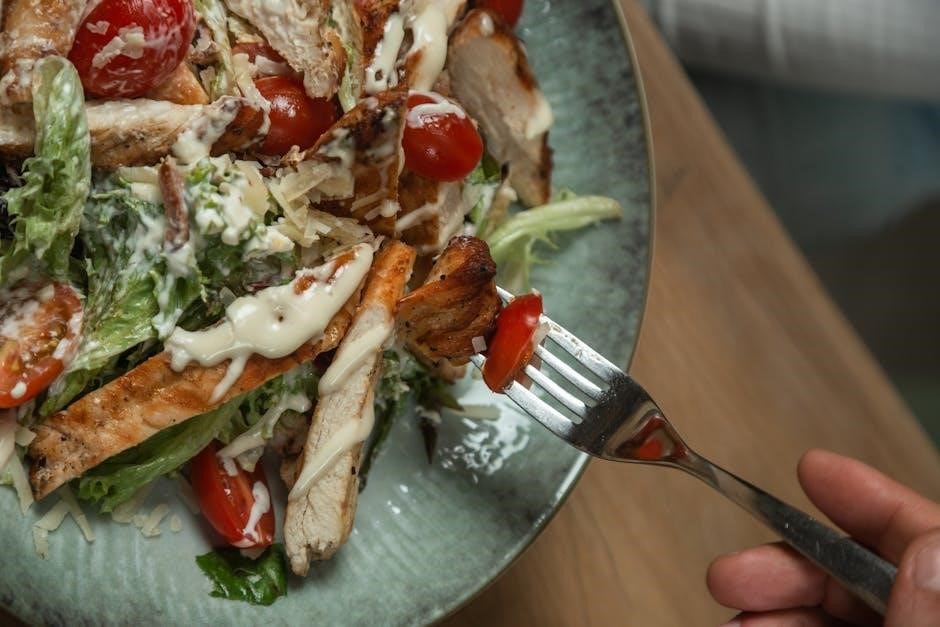
Peptic ulcers are sores in the digestive tract lining, often in the stomach or duodenum. Understanding their nature and impact is crucial for effective management and prevention strategies.
2.1 Causes and Risk Factors
Peptic ulcers are primarily caused by Helicobacter pylori infection and prolonged use of NSAIDs. Risk factors include age over 65, smoking, excessive alcohol consumption, and a family history of ulcers. Stress and certain medical conditions also increase susceptibility. A diet high in spicy or acidic foods can exacerbate symptoms but isn’t a root cause. Managing these factors is essential for prevention and recovery;
2.2 Symptoms of Peptic Ulcers
Common symptoms of peptic ulcers include stomach pain, bloating, and a burning sensation in the abdomen. Nausea, vomiting, and feeling full during meals are also frequent complaints. Some patients experience weight loss or loss of appetite due to discomfort after eating. In severe cases, black stools or bloody vomit may indicate internal bleeding, requiring immediate medical attention. Recognizing these symptoms early is crucial for effective treatment and preventing complications.
2.3 How Food Impacts Peptic Ulcer Healing
Diet plays a pivotal role in peptic ulcer healing by influencing stomach lining repair. Foods like oatmeal, non-citrus fruits, and lean proteins support healing, while spicy or fatty foods can irritate the stomach. Probiotics in low-fat dairy may enhance recovery by balancing gut flora. Avoiding alcohol and NSAIDs is crucial, as they can delay healing. Eating smaller, frequent meals and staying hydrated also aids in reducing stomach acid and promoting recovery, ensuring the ulcer heals faster and prevents future flare-ups.

Key Principles of a Peptic Ulcer Diet
A peptic ulcer diet focuses on bland, easily digestible foods, avoiding irritants like spicy or fatty items, and incorporating probiotics to support healing and reduce discomfort.

3.1 Bland and Easily Digestible Foods
Bland and easily digestible foods are crucial for managing peptic ulcers. These include low-fat dairy, steamed vegetables, lean proteins like chicken, and non-acidic fruits. Whole grains, such as oatmeal and rice, are also beneficial as they are gentle on the stomach. Avoiding spicy, fatty, or high-fiber foods helps reduce irritation and allows the stomach lining to heal. Incorporating these foods into meals can alleviate symptoms and support recovery.
3.2 Avoiding Irritating Foods and Substances
Avoiding irritating foods is essential for managing peptic ulcers. Foods like citrus fruits, tomatoes, chocolate, and spicy dishes can aggravate symptoms. Caffeine, alcohol, and carbonated beverages should also be limited as they can irritate the stomach lining. Additionally, processed and high-sugar foods can slow healing. Eliminating these from the diet helps reduce stomach acid production and prevents further irritation, promoting a faster recovery and reducing discomfort.
3.3 The Role of Probiotics in Healing
Probiotics play a beneficial role in healing peptic ulcers by restoring gut bacteria balance. Foods like yogurt, curd, and buttermilk contain probiotics that strengthen the immune system and reduce inflammation. They also help protect the stomach lining from acid damage, promoting faster recovery. Including probiotic-rich foods in the diet can alleviate symptoms and prevent future ulcers, making them a valuable component of a peptic ulcer healing plan.
Recommended Foods for Peptic Ulcer Patients
A peptic ulcer diet includes high-fiber foods, lean proteins, whole grains, and healthy fats. These foods promote healing and reduce stomach irritation, aiding in recovery.
4.1 High-Fiber Foods
High-fiber foods, such as whole grains, vegetables, and fruits, are beneficial for peptic ulcer patients. They help reduce acid production and promote healing by forming a protective barrier in the stomach lining.
4.2 Lean Protein Sources
Lean protein sources, such as chicken, turkey, fish, and legumes, are essential for healing and maintaining strength. These foods are gentle on the stomach and help repair damaged tissue without triggering acid production. Opt for low-fat or fat-free options to avoid irritation. Plant-based proteins like tofu and beans are also excellent choices, providing essential nutrients while minimizing discomfort. Incorporating these into meals supports overall health and aids in the recovery process for peptic ulcer patients.
4.3 Low-Fat Dairy Products
Low-fat dairy products like curd, buttermilk, and milk are beneficial for peptic ulcer patients. They provide essential nutrients and probiotics, which support gut health. Yogurt, in particular, contains probiotics that strengthen the immune system and aid in healing. These foods are gentle on the stomach lining, reducing irritation and promoting a balanced diet. Incorporating them can help manage symptoms and support the recovery process effectively without causing discomfort or acid production.
4.4 Healthy Fats and Oils
Healthy fats and oils, such as olive oil, avocado, and flaxseed, are beneficial for peptic ulcer patients. They are gentle on the stomach and provide essential fatty acids. These fats support the healing process by reducing inflammation and promoting the integrity of the stomach lining. Incorporating them in moderation can enhance the overall diet, aiding digestion without causing irritation. They also contribute to a balanced nutrition plan, supporting long-term health and ulcer management effectively.
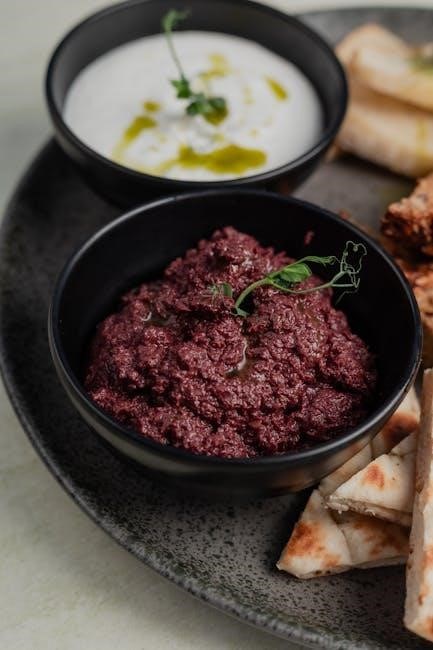
Foods to Avoid
Certain foods can exacerbate peptic ulcers. Avoid spicy, acidic, and high-fat foods, as well as alcohol and caffeine, which can irritate the stomach lining.
5.1 Spicy and Acidic Foods
Spicy and acidic foods can irritate the stomach lining, worsening peptic ulcer symptoms. Avoid chili peppers, citrus fruits, tomatoes, and vinegar-based products. These foods increase stomach acid production, delaying healing and causing discomfort. Opt for mild, non-irritating alternatives to reduce irritation and promote a soothing environment for the stomach lining to heal effectively. Balancing meals with neutral pH foods helps manage symptoms and supports recovery.
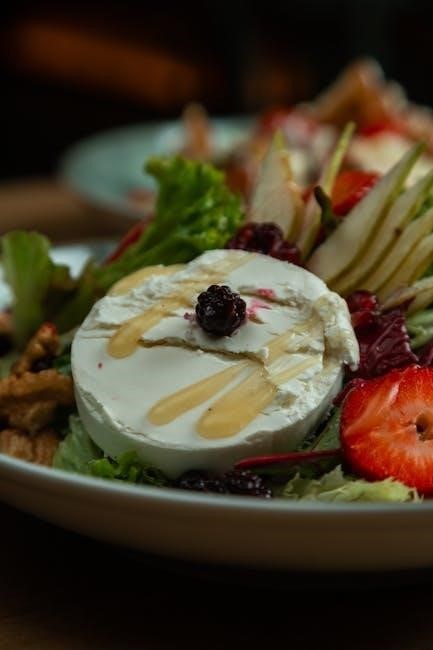
5.2 High-Fat and Fried Foods
High-fat and fried foods can slow digestion, increasing pressure on the stomach and irritating ulcers. They trigger acid production, worsening symptoms like pain and bloating; Fried foods, fatty meats, and processed snacks should be avoided. Choosing lean proteins, low-fat options, and steamed vegetables helps reduce discomfort. A balanced, low-fat diet promotes quicker healing and prevents further irritation, making it essential for managing peptic ulcers effectively.
5.3 Processed and High-Sugar Foods
Processed and high-sugar foods can trigger inflammation and worsen peptic ulcer symptoms. These foods, such as sugary snacks, refined grains, and ready-to-eat meals, often lack essential nutrients and fiber. They can cause spikes in stomach acid, leading to discomfort and slowing healing. Avoiding these foods helps reduce irritation and supports a balanced diet. Opting for whole, nutrient-rich foods instead promotes healing and prevents further complications.
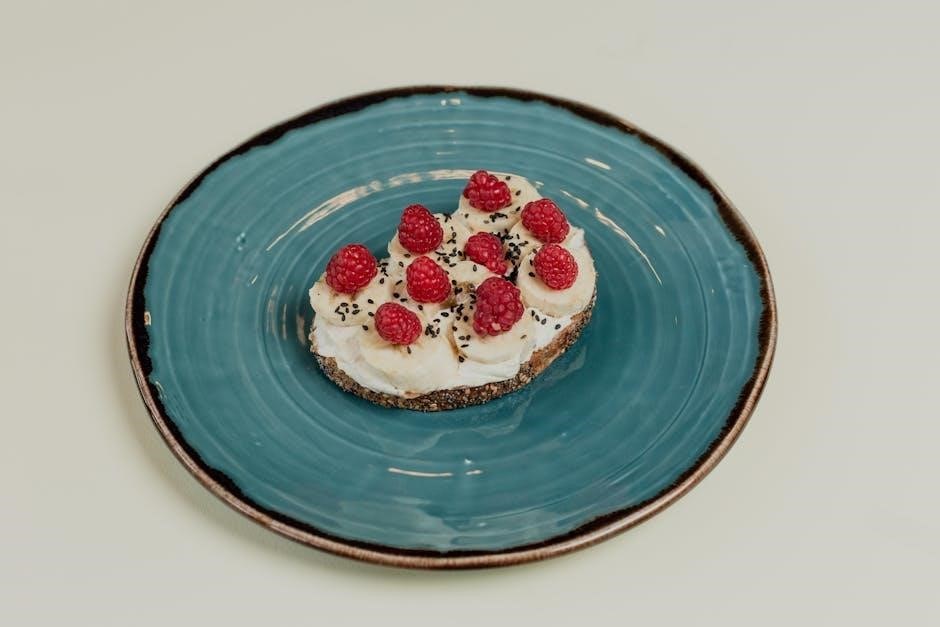
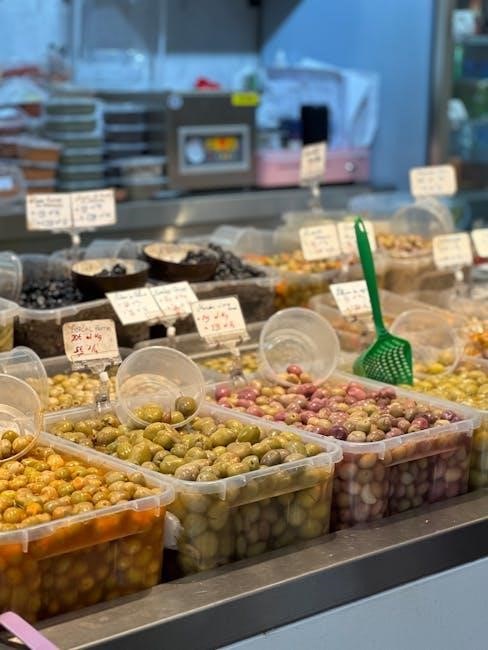
Lifestyle Tips for Managing Peptic Ulcers
Adopting a healthy lifestyle is crucial for managing peptic ulcers. Eating habits, stress management, and avoiding harmful substances can significantly aid in healing and preventing recurrence.
6.1 Eating Small, Frequent Meals
Eating small, frequent meals can help manage peptic ulcer symptoms. This approach reduces stomach acid production and avoids overloading the digestive system, promoting faster healing and comfort.
6.2 Avoiding Late-Night Eating
Avoiding late-night eating is crucial for managing peptic ulcers, as lying down after meals can trigger acid reflux and worsen symptoms. Finishing meals 2-3 hours before bedtime helps reduce stomach acid flow and promotes healing. This practice minimizes discomfort and supports overall digestive health, making it easier to manage peptic ulcer recovery effectively.
6.3 Staying Hydrated
Staying hydrated is essential for digestion and healing in peptic ulcer patients. Drinking water throughout the day helps dilute stomach acid and prevents irritation. Avoid caffeinated or carbonated beverages, as they can worsen symptoms. Herbal teas, like chamomile or ginger, may soothe the stomach lining. Proper hydration supports overall health and aids in preventing acid buildup, which can exacerbate ulcers. Sipping water between meals is recommended to maintain a balanced digestive system and promote healing.
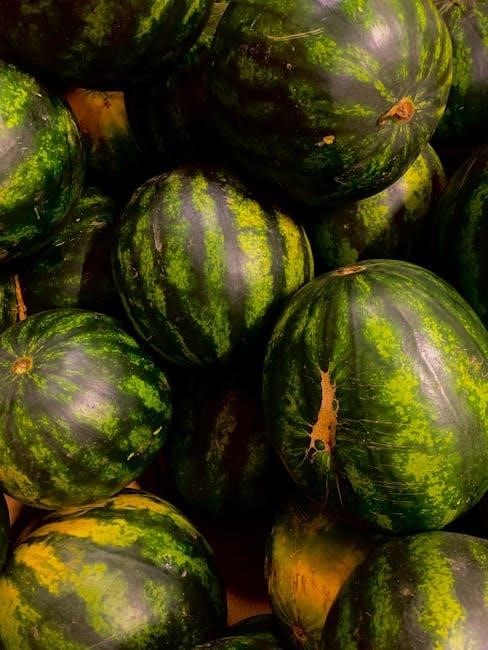
Special Considerations
Additional factors beyond diet, such as monitoring and managing overall health, are crucial for effective peptic ulcer healing and preventing relapse in patients.
7.1 Probiotics and Supplements
Probiotics, found in foods like yogurt, can aid in healing by strengthening the stomach lining and immune system. Supplements such as omega-3 fatty acids and vitamin E may reduce inflammation. Avoiding NSAIDs is crucial, especially for those over 65, as they increase ulcer risk. Consulting a healthcare provider before starting any new supplements ensures safety and effectiveness in managing peptic ulcers.
7.2 Avoiding NSAIDs and Alcohol
NSAIDs can exacerbate peptic ulcers by irritating the stomach lining, particularly in older adults. Alcohol consumption should also be avoided as it can worsen symptoms. Primary prophylaxis is recommended for high-risk individuals, especially those with a history of ulcers. Consulting healthcare providers before using NSAIDs is crucial to prevent complications. Avoiding these substances aids in healing and reduces recurrence risks, promoting overall digestive health and well-being for peptic ulcer patients.
Long-Term Prevention and Monitoring
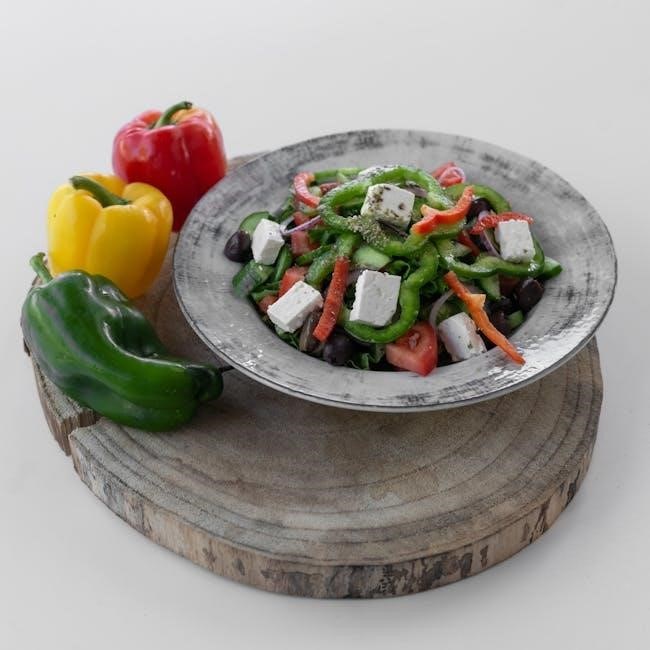
Maintaining a balanced diet and regular medical check-ups are essential for managing peptic ulcers and preventing future occurrences. Monitoring health ensures long-term healing and reduces recurrence risks effectively.
8.1 Maintaining a Balanced Diet
Maintaining a balanced diet is crucial for long-term prevention of peptic ulcers. Focus on high-fiber foods, lean proteins, and low-fat dairy to support healing. Avoid spicy, acidic, and high-fat foods that can irritate the stomach lining. Incorporate bland, easily digestible meals to reduce discomfort and promote recovery. Staying hydrated and eating smaller, frequent meals can also aid in managing symptoms. A consistent diet tailored to individual needs helps prevent recurrence and supports overall gastrointestinal health effectively.
8.2 Regular Medical Check-Ups
Regular medical check-ups are essential for monitoring peptic ulcer healing and preventing complications. They allow healthcare providers to assess treatment effectiveness and adjust plans as needed. Routine visits help identify any signs of recurrence early, ensuring timely interventions. Additionally, check-ups provide opportunities to discuss dietary adjustments and lifestyle changes, reinforcing long-term management strategies. By maintaining consistent communication with a healthcare provider, individuals can ensure their condition remains under control and reduce the risk of future ulcers.
